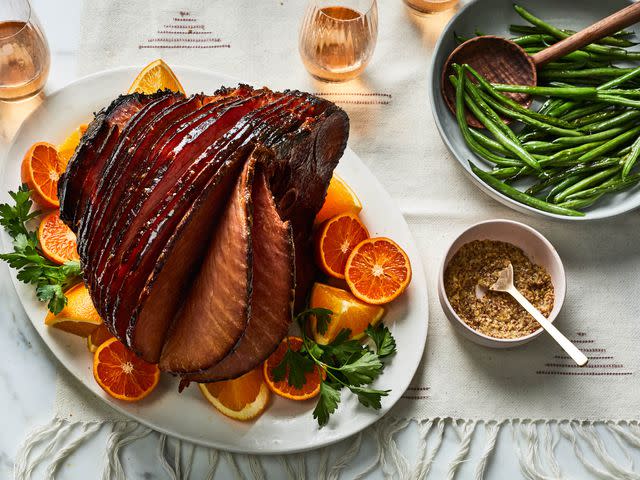How to Cook and Carve a Spiral-Cut Ham
If you’re making cold ham sandwiches, you can even skip the cooking.

Food & Wine / Victor Protasio / Food Styling by Chelsea Zimmer / Prop Styling by Priscilla Montiel
A spiral-cut ham is something to behold. This precooked bone-in ham, which has already been sliced into eye-catching layers, is a guaranteed crowd-pleaser, whether glazed and baked for your holiday centerpiece or sliced cold for ham sandwiches.
Here’s a guide to this popular cut, including how to serve it, the best ways to carve it, and how to cook it (if you’re cooking it at all).
What is spiral-cut ham?
A spiral-cut ham is pork that comes from the leg of the pig that’s been fully cooked and wet-cured, meaning it’s been brined with a combination of water and salt. Available in different sizes, spiral-cut hams are sold presliced, where the ham is still connected to the bone. The long, continuous cut (a spiral, naturally) makes it easy to carve and serve the ham hot or cold. You can also find boneless spiral-cut hams, but they’re less common.
A spiral-cut ham differs from other types of ham on offer at your grocery store or butcher in other ways.
Related: 32 Ham Recipes to Have on Hand
“The language of ham is one of the most confusing to customers,” says Tanya Cauthen, the owner of Belmont Butchery in Richmond, Virginia. At her butcher shop, many people come in and request one type of ham, and then taste a sample and realize that’s not actually what they meant to order.
The complexity stems from how many pork preparations fall under the label “ham.” There are three main subcategories: fresh hams, which are uncooked and sometimes called green hams; salt-cured country hams, which are dry-brined and smoked, and are typically sold unrefrigerated; and wet-cured city hams that are kept in the fridge and available whole, uncut, or spiral-cut.
That latter category of spiral-cut city hams is perennially popular, especially for entertaining. During the holiday season, at least 80% of people who purchase city hams at Belmont Butcher want them spiral-cut, Cauthen says.

How to cook a spiral-cut ham
Because spiral-cut hams are sold fully cooked, “you can technically eat [one] without reheating it,” says Kelly Kawachi, a head butcher at Blackbelly Market in Denver and Boulder, Colorado. “It’s easier to cut, more simple to prepare, and quicker to cook than a whole ham.”
If you prefer to serve the ham warm, cook the spiral-cut ham in a foil-covered baking dish at 350° F for 1 1/2- to 2 ½ hours, or until an instant-read thermometer in the thickest part of the ham reads 140°F.
While glazing a spiral-cut ham isn’t necessary before serving it, it’s a popular way to add flavor and seal in moisture so your ham emerges from the oven rich and juicy. Apple cider–glazed ham, honey bourbon–glazed ham, and Guinness-glazed ham are just a few of many options for glazing your ham.
Related: 11 Sweet, Spicy, Shiny Ways to Glaze That Holiday Ham
“I like to glaze a ham with jam or some kind of preserve as it’s heating up,” says Ethan Perry, another head butcher at Blackbelly Market. “Last Christmas, I made a spiral ham with a pineapple and jalapeno jam.”
Not in the mood to turn on the oven? Bring a spiral-cut ham to room temperature, then carve off slices to serve in sandwiches with Dijon, brown, or yellow mustard. You can also shred slices of spiral-cut ham into soup or scrambled eggs, or cube them and serve in a ham-and-potato salad.
How to carve a spiral-cut ham
Since spiral-cut ham slices are still connected to the bone, you have to cut them off to serve. Here’s how to carve a spiral-cut ham in four easy steps:
Use a large fork to hold the ham in place while you slide a sharp knife perpendicularly into the ham, and follow along the ham bone to cut all around it. You don’t need to cut all the way into the ham and remove the bone entirely; simply circle your knife around the ham bone a few inches at a time, and repeat the process as needed after you’ve removed some slices.
Once you’ve disconnected a few inches of the bone from the spiral-cut ham, use your knife to remove the slices from the center. Since they’re pre-cut, they’ll come right off.
Repeat steps one and two until you’ve either cut all the ham off the bone, or you’ve cut as much as you plan to serve.
To serve, lay the slices out on a platter or on individual plates. If you cooked your ham with a glaze, spoon some of the sauce on top of the slices.

 Yahoo Lifestyle
Yahoo Lifestyle 
